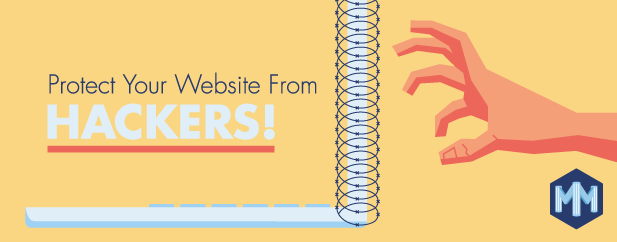Protect Your Website from Hacks

In the online world you’ll find lots of great things, but there are also many hidden dangers that are easy for the average person to forget about. If you have a website of any kind, there is always the potential of a cyberattack. Hackers are a real threat, and they perform attacks for all kinds of reasons. I’ve had to deal with a few of our clients websites which have come under attack.
Whether your site is a personal blog, a hobby, or a business platform, you’ll want to make sure that it’s protected from online vulnerabilities that can have real life consequences. In this post I’ll share some tips on how to keep your website secure and protect it from hackers.
Broadly speaking, a cyberattack is an attempt by a hacker to expose, alter, disable, destroy, steal or gain unauthorized access to a computer network or system. You may think it can’t happen to you, but it can and it likely will if you do not take the steps to secure your website. To a hacker, any vulnerability is an opportunity, so the key is to be proactive and take the steps to protect your assets ahead of time.
Tip #1: Create Strong Passwords
This might sound obvious, but passwords are always your first line of defence against a hacker. This means that you need to develop strong passwords for both your server and website’s admin services. A strong password should include uppercase and lowercase characters, special characters, and numbers. While some people will suggest using a random phrase, the strongest passwords are actually random sequences of letters, numbers and symbols.
If you find yourself struggling to keep track of all of your passwords, I would recommend using Last Pass. This tool can help you create strong new passwords as well as keep track of multiple passwords across your platforms in a secure way. It will also save you time and aggravation trying to remember all of your passwords. It also is an Iphone app which makes it more useful than browser password managers as you can access to any passwords all the time.
Tip #2: Prevent SQL Injection Attacks
An SQL injection attack is a specific cyberattack in which the attacker will use a URL parameter or web form file to access your website’s database. Even though the SQL injection is over 15 years old, it is still proven to be a successful attack method for hackers across the world. For websites with a standard Transact SQL, the attacker can just insert a piece of code into a query that will allow them to change tables and access or delete data. You can prevent this simply by using parameterized queries. If you are not a web developer, speak to your web development service provider to make sure they implement parameterized queries for your website.
Tip #3: Install Security Plugins
A great way to enhance the security of your website is to install dedicated security plugins. If you use a web host such as WordPress, there are several plugins available for you to download such as 6Scan Security, Sucuri Security, and WordFence. These plugins offer a wide range of features from automatic vulnerability fixes to protection against various types of attacks to firewall protection. It’s best to compare the plugins available and select one with the features that work best for you.
Tip #4: Stay Up to Date
One of the most common vulnerabilities that lead to successful cyber attacks is out of date software. Whether it be website themes, plugins, or other software, it is crucial to keep it up to date at all times. Updates are released for a reason: and that reason is to patch potential vulnerabilities, fix mistakes, and keep your website secure and running smoothly.
Tip #5: Set Up File Permissions
File permissions: do you understand how they work and what they can do for you? A website is made of many files including plugin files, media files, design files, and more. If one of these files is granted an incorrect permission, a vulnerability can be created which a hacker can then exploit. You especially want to avoid giving important files the execute permission, which grants full control. To avoid creating accidental vulnerabilities, learn how your permissions work or ask your web developer to double check the file permissions for you.
When you’ve put so much effort into building your website or brand, you don’t want it to be ruined by some anonymous hacker on the other side of the globe. Following the above 5 tips will help your website stay secure so that you can protect your content and data and keep doing what you love. Remember: you can never be to careful when it comes to website security.
Want to talk about web development? Contact us and I’d be happy to chat about keeping your website secure.
